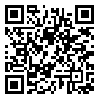1. Haghighat S, Akbari M, Ghaffari S, Yavari P. Standardized breast cancer mortality rate compared to the general female population of Iran. Asian Pac J Cancer Prev. 2012; 13(11):5525-8. [
DOI:10.7314/APJCP.2012.13.11.5525] [
PMID]
2. Shahidsales S, Hosseini S, Ahmadi-Simab S, Ghavam-Nasiri M. The importance of prognostic factors (ER, PR, P53) in breast cancer and their relationship with stage of disease. Med J Mashhad Univ Med Sci. 2014; 57(2):457-63.
3. Alligood M, Tomey A. Nursing theorists and their work. 5 ed. St. Louis: Elsevier; 2014.
4. Brown SG, Hudson DB, Campbell-Grossman C, Kupzyk KA, Yates BC, Hanna KM. Social support, parenting competence, and parenting satisfaction among adolescent, African American, mothers. West J Nurs Res. 2018; 40(4):502-19. [
DOI:10.1177/0193945916682724] [
PMID] [
PMCID]
5. Vallido T, Wilkes L, Carter B, Jackson D. Mothering disrupted by illness: a narrative synthesis of qualitative research. J Adv Nurs. 2010; 66(7):1435-45. [
DOI:10.1111/j.1365-2648.2010.05350.x] [
PMID]
6. Ambrósio DCM, Santos MAd. Social support to women after mastectomy: a review study. Cien Saude Colet. 2015; 20(3):851-64. [
DOI:10.1590/1413-81232015203.13482014] [
PMID]
7. Bultmann JC, Beierlein V, Romer G, Möller B, Koch U, Bergelt C. Parental cancer: Health‐related quality of life and current psychosocial support needs of cancer survivors and their children. Int J Cancer. 2014; 135(11):2668-77. [
DOI:10.1002/ijc.28905] [
PMID]
8. Yfantis A, Intas G, Tolia M, Nikolaou M, Tsoukalas N, Lymperi M, et al. Health-related quality of life of young women with breast cancer. Review of the literature. J BUON. 2018; 23(1):1-6.
9. Tavares R, Brandão T, Matos PM. Mothers with breast cancer: A mixed‐method systematic review on the impact on the parent‐child relationship. Psycho‐Oncology. 2018; 27(2):367-75. [
DOI:10.1002/pon.4451] [
PMID]
10. Strickland JT. Helene Hudson Lecture Young mothers’ engagement with the cancer care system. Can Oncol Nurs J/Revue canadienne de soins infirmiers en oncologie. 2015;25(3):270-4.
11. Mousvi Diva R, Moghadam N, Amani O. Evaluating family functioning and spiritual health in women with breast cancer, cancer-treated and healthy women. Iran J Psych Nurs. 2017; 5(5):49-56. [
DOI:10.21859/ijpn-05057]
12. Goodwin S, Huppatz K. Mothers making class distinctions: the aesthetics of maternity. The Good Mother: Contemporary Motherhoods in Australia. Sydney: Sydney University Press; 2010. p. 69. [
DOI:10.2307/j.ctv1sr6kgj.8]
13. Bultmann JC BV, Romer G, Möller B, Koch U, Bergelt C. Parental cancer: Health‐related quality of life and current psychosocial support needs of cancer survivors and their children. Int J Cancer 2014; 135(11):77-2668. [
DOI:10.1002/ijc.28905] [
PMID]
14. Whitehead L, Jacob E, Towell A, Abu‐Qamar Me, Cole‐Heath A. The role of the family in supporting the self‐management of chronic conditions: A qualitative systematic review. J Clinic Nurs. 2018; 27(1-2):22-30. [
DOI:10.1111/jocn.13775] [
PMID]
15. Drageset S, Lindstrøm TC, Giske T, Underlid K. Women's experiences of social support during the first year following primary breast cancer surgery. Scand J Caring Sci. 2016; 30(2):340-8. [
DOI:10.1111/scs.12250] [
PMID]
16. Vaziri S, Lotfi Kashani F, Akbari ME, Ghorbani Ashin Y. Comparing the motherhood and spouse role in women with breast cancer and healthy women. Iranian J Breast Dis. 2014; 7(2):76-83.
17. Ruddick S. Maternal thinking. Fem Stud. 1980; 6(2):342-67. [
DOI:10.2307/3177749]
18. De Castro EK, Dornel ALK, De Sousa MA. The experience of motherhood during treatment. Int J Behav Med. 2018; 23(39559):1-16. [
DOI:10.4025/psicolestud.v23i0.39559]
19. Hashemi‐Ghasemabadi M, Taleghani F, Kohan S, Yousefy A. Living under a cloud of threat: the experience of Iranian female caregivers with a first‐degree relative with breast cancer. Psycho‐Oncology. 2017; 26(5):625-31. [
DOI:10.1002/pon.4198] [
PMID]
20. Arber A. How do nurses "Think Family" and support parents diagnosed with cancer who have dependent children? Asia-Pac J Oncol Nurs. 2016; 3(3):214. [
DOI:10.4103/2347-5625.189809] [
PMID] [
PMCID]
21. Polit DF, Beck CT. Essentials of nursing research: Appraising evidence for nursing practice. 7 ed. Philadelphia: Lippincott Williams & Wilkins; 2010.
22. Graneheim UH, Lundman B. Qualitative content analysis in nursing research: concepts, procedures and measures to achieve trustworthiness. Nurs Educ Today. 2004; 24(2):105-12. [
DOI:10.1016/j.nedt.2003.10.001] [
PMID]
23. Software V. MAXQDA analytics pro [Computer program]. Author Berlin; 2016.
24. Lincoln YS, Guba EG. Naturalistic Inquiry. illustrated, reprint ed. New York: Sage publications; 1985.
25. Ainsworth MDS, Blehar MC, Waters E, Wall SN. Patterns of Attachment: A psychological study of the strange situation. Classic ed. London: Taylor & Francis; 2015. [
DOI:10.4324/9781315802428]
26. Wilson S. ‘When you have children, you’re obliged to live’1: motherhood, chronic illness and biographical disruption. Sociol Health Illn. 2007;29(4):610-26. [
DOI:10.1111/j.1467-9566.2007.01008.x] [
PMID]
27. Noorisanchooli H, Rahnam M, Haghighi MJ, Hashemi SA, Younesbarani Z. The familial experiences of women with breast cancer referring to chemotherapy clinic: A qualitative study. Clin Cancer Invest J. 2018; 7(6):210-6. [
DOI:10.4103/ccij.ccij_92_18]
28. Rashi C, Wittman T, Tsimicalis A, Loiselle CG. Balancing illness and parental demands: Coping with cancer while raising minor children. Oncol Nurs Fourm. 2015; 42(4):337-44. [
DOI:10.1188/15.ONF.337-344] [
PMID]
29. Bekteshi V, Kayser K. When a mother has cancer: pathways to relational growth for mothers and daughters coping with cancer. Psycho‐Oncology. 2013; 22(10):2379-85. [
DOI:10.1002/pon.3299] [
PMID]
30. Kian F, Etemadi O, Bahrami F. Exploring parenting styles of insecure Iranian mothers. Early Child Dev Care. 2019:1-8.
31. Kuswanto CN, Stafford L, Sharp J, Schofield P. Psychological distress, role, and identity changes in mothers following a diagnosis of cancer: A systematic review. Psycho‐Oncology. 2018; 27(12):2700-8. [
DOI:10.1002/pon.4904] [
PMID]
32. Mazzotti E, Serranò F, Sebastiani C, Marchetti P. Mother-child relationship as perceived by breast cancer women. Psychology. 2012;3(12):1027. [
DOI:10.4236/psych.2012.312154]
33. Sadeghi E, Gozali N, Tabrizi FM. Effects of energy conservation strategies on cancer related fatigue and health promotion lifestyle in breast cancer survivors: A randomized control trial. Asian Pac J Cancer Prev. 2016; 17(10):4783-90.
34. Helseth S, Ulfsæt N. Parenting experiences during cancer. J Adv Nurs. 2005; 52(1):38-46. [
DOI:10.1111/j.1365-2648.2005.03562.x] [
PMID]
35. Öhlén J, Holm AK. Transforming desolation into consolation: Being a mother with life-threatening breast cancer. Health Care Women Int. 2006; 27(1):18-44. [
DOI:10.1080/07399330500377226] [
PMID]
36. Semple C, McCaughan E. Family life when a parent is diagnosed with cancer: Impact of a psychosocial intervention for young children. Eur J Cancer Care. 2013; 22(2):219-31. [
DOI:10.1111/ecc.12018] [
PMID]








 gmail.com
gmail.com